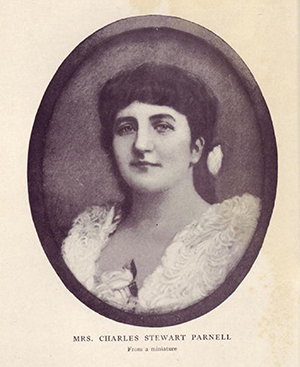100 YEARS AGO: Katharine Parnell dies
Published in Issue 1 (January/February 2021), Reviews, Volume 29By Joseph E.A. Connell Jr
 Though the Home Rule Bill of 1886 met with fierce opposition, it was Parnell’s affair with the married Katharine O’Shea that was fatal to his leadership and, ultimately, to Home Rule in his time. His refusal to step down after Mrs O’Shea’s sensational divorce case produced bitter division. Meetings of the Irish Parliamentary Party (IPP) were held in December 1890; after a long and acrimonious discussion on whether the man (Parnell) was more important than the cause (Home Rule), the party split and Parnell lost his leadership.
Though the Home Rule Bill of 1886 met with fierce opposition, it was Parnell’s affair with the married Katharine O’Shea that was fatal to his leadership and, ultimately, to Home Rule in his time. His refusal to step down after Mrs O’Shea’s sensational divorce case produced bitter division. Meetings of the Irish Parliamentary Party (IPP) were held in December 1890; after a long and acrimonious discussion on whether the man (Parnell) was more important than the cause (Home Rule), the party split and Parnell lost his leadership.
Katharine O’Shea—or, following her second marriage, Katharine Parnell—was an Englishwoman of aristocratic background, born Katharine Wood on 30 January 1846, the daughter of Sir John Page Wood, 2nd baronet, and granddaughter of Sir Matthew Wood, a former lord mayor of London.
Katharine first met Parnell in 1880, when she was already separated from her husband, Captain William O’Shea, a Catholic IPP MP for County Clare. Thanks to her family connection to the Liberal Party, she acted as liaison between Parnell and Gladstone during negotiations prior to the introduction of the first Home Rule Bill in April 1886. Three of Katharine’s children were fathered by Parnell. The first died early in 1882; the others were Claire and Katharine.
Captain O’Shea knew about the relationship. He challenged Parnell to a duel in 1881 and initially forbade his wife (from whom he was separated but not divorced) to see Parnell, although she said that he encouraged her in the relationship. Nevertheless, he maintained a public silence for several years. His reasons for filing for divorce in 1889 are a matter for speculation. He may have had political motives. Alternatively, it was claimed that he had been hoping for an inheritance from Katharine’s rich aunt, whom he had expected to die earlier, but when she died in 1889 her money was left in trust to cousins.
Parnell was named as co-respondent in the divorce proceedings. Although his relationship with Katharine had been a subject of gossip in London political circles from 1881, public knowledge of the affair in an England governed by so-called ‘Victorian morality’ created a huge scandal. Catholic Ireland was further shocked when Katharine broke the vows of her previous Catholic marriage by marrying Parnell on 25 June 1891.
The divorce and remarriage led to Parnell’s being deserted by a majority of his own party and to his downfall as its leader. With his political life and his health essentially ruined, he died in Katharine’s arms at the age of 45 on 6 October 1891, less than four months after their marriage. The cause was cancer of the stomach, possibly complicated by coronary heart disease inherited from his grandfather and father, who had also died prematurely.
Katharine published a biography of Parnell in 1914 as ‘Katharine O’Shea (Mrs Charles Stewart Parnell)’; to her friends, however, she was known as Katie O’Shea. Though Parnell always called her ‘Queenie’ rather than Katie, the nickname is important. Parnell’s enemies, in order to damage him personally, called her ‘Kitty O’Shea’ because at that time ‘Kitty’, as well as being just a diminutive of Catherine/Katherine/Katharine, was also a slang term for a prostitute.
Katharine Parnell lived the rest of her life in relative obscurity and died on 5 February 1921.
Joseph E.A. Connell Jr is the author of The shadow war: Michael Collins and the politics of violence (Eastwood Books).
















